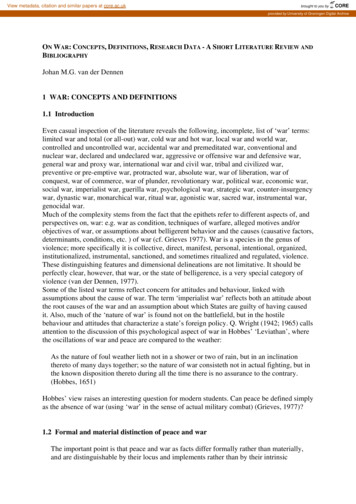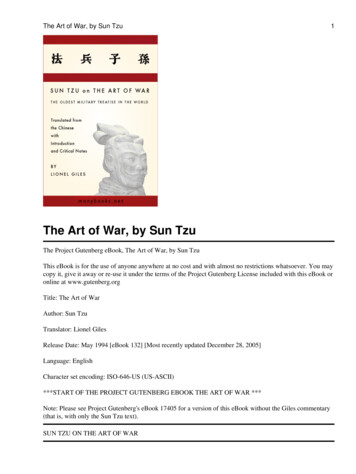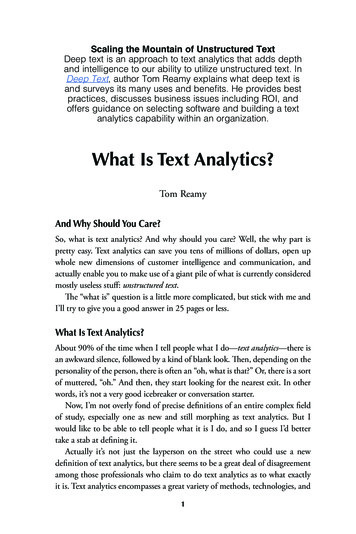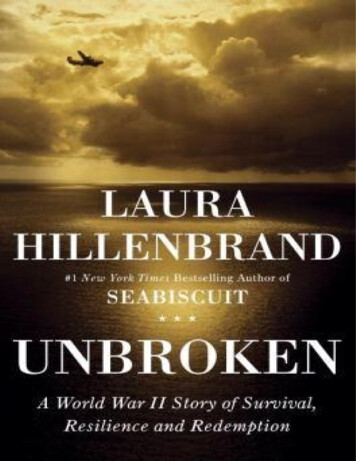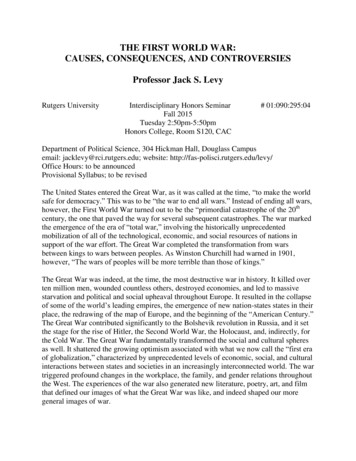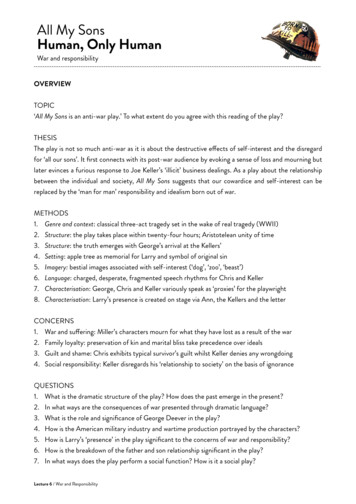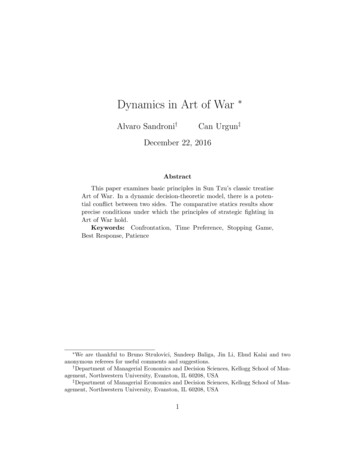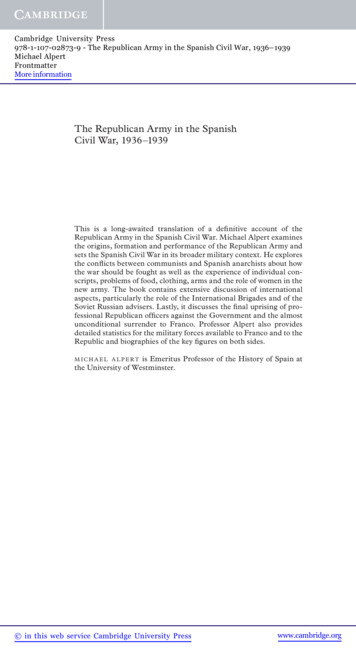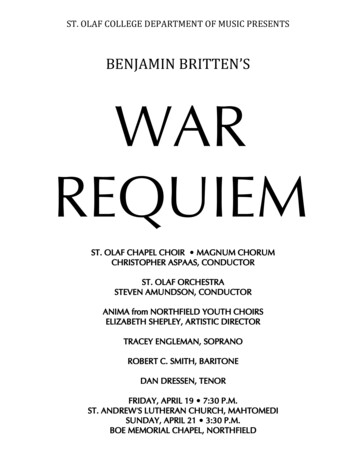
Transcription
TTEN’SWARREQUIEM’
Following the devastating bombing of the Cathedral at Coventry, England, Cathedral stonemasonJock Forbes saw two wooden beams lying in the shape of a cross and tied them together. Areplica of the wooden cross, built in 1964, has replaced the original in the ruins of the oldcathedral on an altar of rubble. The original is now kept on the stairs linking the new Cathedralwith St. Michael’s Hall below.— photo by Shannon Cordes ’14“My subject is War, and the pity of War.The Poetry is in the pity All a poet can do today is warn.”— Wilfred OwenUnauthorized photography or video and audio recording is prohibited. The Boe Chapel performance is archived athttp://www.stolaf.edu/multimediaPlease silence your cell phone, pager or other personal communication device.
WAR REQUIEM, OP. 66Benjamin Britten (1913-1976)Words from the Missa pro Defuntis and the poems of Wilfred OwenIRequiem aeternamCHORUSRequiem aeternam dona eis Domine,et lux perpetua luceat eisRest eternal grant them, Lord;and may everlasting light shine upon them.TREBLE CHOIRTe decet hymnus, Deus in Sion;et tibi reddetur votum in Jerusalem;exaudi orationem meam,ad te omnis caro venietSongs of praise are due to Thee, God, in Zion;and prayers offered up to Thee in Jerusalem;hear my prayer,all flesh shall come to Thee.TENOR SOLOWhat passing-bells for these who die as cattle?Only the monstrous anger of the guns.Only the stuttering rifles’ rapid rattleCan patter out their hasty orisons.No mockeries for them from prayers or bells,Nor any voice of mourning save the choirs, –The shrill, demented choirs of wailing shells;And bugles calling for them from sad shires.What candles may be held to speed them all?Not in the hands of boys, but in their eyesShall shine the holy glimmers of good-byes.The pallor of girls’ brows shall be their pall;Their flowers the tenderness of silent minds,And each slow dusk a drawing-down of blinds.[‘Anthem for Doomed Youth’]CHORUSKyrie eleisonChriste eleisonKyrie eleisonLord have mercy,Christ have mercy,Lord have mercy.
IIDies iraeCHORUSDies irae, dies illa,Solvet saeclum in favilla,Teste David cum Sibylla.Day of anger, that day,Shall dissolve this generation into ashes,With David and the Sibyl as witness.Quantus tremor est futurus,Quando Judex est venturus,Cuncta stricte discussurus!How much quaking there will be,When the Judge will come,To weigh all things strictly.Tuba mirum spargens sonumPer sepulchra regionumCoget omnes ante thronum.The trumpet pouring forth its awful soundThrough the tombs of the landsDrives everyone before the throne.Mors stupebit et natura,Cum resurget creatura,Judicanti responsura.Death shall be stunned, and nature,When life shall rise again,To answer for itself before the Judge.BARITONE SOLOBugles sang, saddening the evening air,And bugles answered, sorrowful to hear.Voices of boys were by the river-side.Sleep mothered them; and left the twilight sad.The shadow of the morrow weighed on men.Voices of old despondency resigned,Bowed by the shadow of the morrow, slept.[untitled]SOPRANO SOLO AND CHORUSLiber scriptus proferetur,In quo totum contineturUnde mundus judicetur.A book inscribed shall be brought forth,In which all is contained,From which the world shall be judged.Judex ergo cum sedebit,Quidquid latet, apparebit:Nil inultum remanebit.When the Judge, therefore, shall sit,Whatever is concealed shall appear:Nothing unavenged shall remain.Quid sum miser tunc dicturus?Quem patronum rogaturus,Cum vix justus sit securus?What am I, a wretch, to say then?To whom as defender shall I entreat,Since the just man is scarcely safe?Rex tremendae majestatis,Qui salvandos salvas gratis,Salva me, fons pietatis.King of fearful majesty,Who freely savest those who are to be saved,Save me, fountain of compassion.
TENOR AND BARITONE SOLOSOut there, we’ve walked quite friendly up to Death;Sat down and eaten with him, cool and bland, –Pardoned his spilling mess-tins in our hand.We’ve sniffed the green thick odour of his breath, –Our eyes wept, but our courage didn’t writhe.He’s spat at us with bullets and he’s coughedShrapnel. We chorussed when he sang aloft;We whistled while he shaved us with his scythe.Oh, Death was never enemy of ours!We laughed at him, we leagued with him, old chum.No soldier’s paid to kick against his powers.We laughed, knowing that better men would come,And greater wars; when each proud fighter bragsHe wars on Death – for life; not men – for flags.[‘The Next War’]CHORUSRecordare Jesu pie,Quod sum causa tuae viae:Ne me perdas illa die.Recall, kind Jesus,That I am the reason for your being:Lest Thou do away with me on that day.Quaerens me, sedisti lassus:Redemisti crucem passus:Tantus labor non sit cassus.Searching for me, Thou didst sit exhausted:Thou hast redeemed me by suffering the cross:So much toil should not be in vain.Ingemisco, tamquam resu:Culpa rubet vultus meus:Supplicanti parce Deus.I sigh, so great a sinner:Guilt reddens my face:Spare the supplicant, God.Qui Mariam absolvisti,Et latronem exaudisti,Mihi quoque spem dedisti.Thou who hast forgiven Mary,And hast listened to the robber,And hast also given hope to me.Inter oves locum praesta,Et ab haedis me sequestra,Statuens in parte dextra.Set me down amongst the sheep,And remove me from the goats,Standing at Thy right hand.Confutatis maledictis,Flammis acribus addictis,Voca me cum benedictis.With the damned confounded,To the crackling flames consigned,Call me with your saints.Oro supplex et acclinis,Cor contritum quasi cinis:Gere curam mei finis.I pray, kneeling and supplicant,My heart worn away like ashes:Protect me at my ending.BARITONE SOLOBe slowly lifted up, thou long black arm,Great gun towering toward Heaven, about to curse;Reach at that arrogance which needs thy harm,And beat it down before its sins grow worse;But when thy spell be cast complete and whole,May God curse thee, and cut thee from our soul![from ‘Sonnet: On Seeing a Piece of Our Artillery Brought into Action’]
CHORUS AND SOPRANO SOLODies irae, dies illa,Solvet saeclum in favilla,Teste David cum Sibylla.Day of anger, that day,Shall dissolve this generation into ashes,With David and the Sybil as witness.Quantus tremor est futurus,Quando judex est venturus,Cuncta stricte discussurus!How much quaking there will be,When the Judge will come,To weigh all things strictly.Lacrimosa dies illa,Qua resurget ex favilla,Judicandus homo reus,Huic ergo parce Deus.That tearful day,On which shall arise again from the ashes,The sinner to be judged,Spare him accordingly, God.TENOR SOLOMove him into the sun –Gently its touch awoke him once,At home, whispering of fields unsown.Always it woke him, even in France,Until this morning and this snow.If anything might rouse him nowThe kind old sun will know.Think how it wakes the seeds, –Woke, once, the clays of a cold star.Are limbs, so dear-achieved, are sides,Full-nerved – still warm – too hard to stir?Was it for this the clay grew tall?– O what made fatuous sunbeams toilTo break earth’s sleep at all?[‘Futility’]CHORUSPie Jesu Domine,dona eis requiem.Amen.Kind Jesus, Lordgrant them rest.Amen.IIIOffertoriumTREBLE CHOIRDomine Jesu Christe,Rex gloriae,libera animas omnium fideliumdefunctorum de poenis inferni,et de profondo lacu:libera eas de ore leonis,ne absorbeat eas tartarusne cadant in obscurum.Lord Jesus Christ,King of glory,free the souls of all the faithfuldead from the tortures of hell,and from the bottomless pit:free them from the mouth of the lion,that hell may not swallow them up,nor may they fall into darkness.
CHORUSSed signifier sanctus Michaelrepraesentet eas in lucem sanctam:quam olim Abrahae promisisti,et semini ejus.But the holy standard-bearer Michaelshall bring them back into the holy light:as Thou once didst promise to Abraham,and his offspring.BARITONE AND TENOR SOLOSSo Abram rose, and clave the wood, and went,And took the fire with him, and a knife.And as they sojourned both of them together,Issac the first-born spake and said, My Father,Behold the preparations, fire and iron,But where the lamb for this burnt-offering?Then Abram bound the youth with belts and straps,And builded parapets and trenches there,And stretchèd forth the knife to slay his son.When lo! an angel called him out of heaven,Saying, Lay not thy hand upon the lad,Neither do anything to him. Behold,A ram, caught in a thicket by its horns;Offer the Ram of Pride instead of him.But the old man would not so, but slew his son, –And half the seed of Europe, one by one.[‘The Parable of the Old Man and the Young’]TREBLE CHOIRHostias et precestibi Domine laudis offerimus:tu suscipe pro animabus illis,quarum hodie memoriam facimus:fac eas, Domine,de morte transire ad vitam.Sacrifices and prayerswe offer to Thee, Lord, with praise:receive them for the souls of thosewhose memory we recall today:make them, Lord,to pass from death to life.IVSanctusSOPRANO SOLO AND CHORUSSanctus, sanctus, sanctusDominus Deus Sabaoth.Pleni sunt coeli et terra Gloria tua,Hosanna in excelsis.Benedictus qui venit in nomine Domini.Hosanna in excelsis.Holy, holy, holyLord God of Hosts.Full are heaven and earth with Thy glory.Hosanna in the highest.Blessed is he who comes in the name of theLord.Hosanna in the highest.
BARITONE SOLOAfter the blast of lightning from the East,The flourish of loud clouds, the Chariot Throne;After the drums of Time have rolled and ceased,And by the bronze west long retreat is blown,Shall life renew these bodies? Of a truthAll death will He annul, all tears assuage? –Fill the void veins of Life again with youth,And wash, with an immortal water, Age?When I do ask white Age he saith not so:‘My head hangs weighed with snow.’And when I hearken to the Earth, she saith:‘My fiery hear shrinks, aching. It is death.Mine ancient scars shall not be glorified,Nor my titanic tears, the sea, be dried.’[‘The End’]VAgnus DeiTENOR SOLOOne ever hangs where shelled roads part.In this war He too lost a limb,But His disciples hide apart;And now the Soldiers bear with Him.CHORUSAgnus Dei,qui tollis peccata mundi,dona eis requiem.Lamb of Godwho takest away the sins of the world,grant them rest.TENOR SOLONear Golgotha strolls many a priest,And in their faces there is prideThat they were flesh-marked by the BeastBy whom the gentle Christ’s denied.CHORUSAgnus Dei,qui tollis peccata mundi,dona eis requiem.Lamb of Godwho takest away the sins of the world,grant them rest.
TENOR SOLOThe scribes on all the people shoveAnd bawl allegiance to the state,But they who love the greater loveLay down their life; they do not hate.[‘At a Calvary near the Ancre’]CHORUSAgnus Dei,qui tollis peccata mundi,dona eis requiem sempiternam.Lamb of Godwho takest away the sins of the world,grant them rest everlasting.TENOR SOLODona nobis pacem.Grant us peace.VILibera meCHORUS AND SOPRANO SOLOLibera me, Domine, de morte aeterna,in die illa tremenda:Quando coeli movendi sunt et terra:Dun veneris judicaresaeculum per ignem.Tremens factus sum ego, et timeo,dum discussio venerit,atque ventura ira.Libera me, Domine, de morte aterna,Quando coeli movendi sunt et terra.Dies illa, dies irae,calamitatis et miseriae,dies magna et amara valde.Libera me, Domine . . .Free me, Lord, from eternal death,on that dreadful day.When the skies and ground shall quake:When Thou comest to judgeour generation through fire.I am made to tremble, and am afraid,until the trial shall come,and the anger arrive.Free me, Lord, from eternal death,When the skies and ground shall quake.That day, day of angerof disaster and misery,a great day and intensely bitter.Free me, Lord . . .TENOR SOLOIt seemed that out of battle I escapedDown some profound dull tunnel, long since scoopedThrough granites which titanic wars had groined.Yet also there encumbered sleepers groaned,Too fast in thought or death to be bestirred.Then, as I probed them, one sprang up, and staredWith piteous recognition in fixed eyes,Lifting distressful hands as if to bless.And no guns thumped, or down the flues made moan.‘Strange friend,’ I said, ‘here is no cause to mourn.’
BARITONE SOLO‘None,’ said the other, ‘save the undone years,The hopelessness. Whatever hope is yours,Was my life also; I went hunting wildAfter the wildest beauty in the world.For by my glee might many men have laughed,And of my weeping something had been left,Which must die now. I mean the truth untold,The pity of war, the pity war distilled.Now men will go content with what we spoiled.Or, discontent, boil bloody, and be spilled.They will be swift with swiftness of the tigress,None will break ranks, though nations trek from progress.Miss we the march of this retreating worldInto vain citadels that are not walled.Then, when much blood had clogged their chariot-wheels,I would go up and wash them from sweet wells,Even from wells we sunk too deep for war,Even the sweetest wells that ever were.I am the enemy you killed, my friend.I knew you in this dark; for so you frownedYesterday through me as you jabbed and killed.I parried; but my hands were loath and cold.’TENOR AND BARITONE SOLOS‘Let us sleep now . . .’[‘Strange Meeting’]TREBLE CHOIR, CHORUS, AND SOPRANO SOLOIn paradisum deducant te Angeli:To heaven may the Angels escort you;in tuo adventu suscipiant te Martyres,on your arrival may the Martyrs accept you,et perducant teand lead youin civitatem sanctam Jerusalem.to the sacred city Jerusalem.Chorus Angelorum te suscipiat,May the Choir of Angels receive youet cum Lazaro quondam paupereand with Lazarus, once a pauper,aeternam habeas requiem.may you have rest eternal.Requiem aeternam dona eis, Domine;et lux perpetua luceat eis.Requiescant in pace.Amen.Rest eternal grant them, Lord,and may everlasting light shine upon them.May they rest in peace.Amen.
If you would like to enjoy this program again, you can! Tune to Classical Minnesota PublicRadio, including KSJN, 99.5 FM, at 8 p.m., Tuesday, April 30 for the broadcast of our performance.Classical Minnesota Public Radio is also scheduling a November re-broadcast in honor of Britten’scentenary.NOTESOn the terrible night of November 14, 1940, fire came down from the skies over Coventry, England, in the form ofincendiary bombs from German planes. The center of the city was destroyed, including much of the old cathedral. Outof the charred ruins the next morning, a cross was erected from two burned beams under which was inscribed “Father,forgive.” This was the spirit that grew from that dreadful night-a spirit of forgiveness and reconciliation, which wasalso important in the planning of the new cathedral. Gifts and craftsmen came from all over the world to build theedifice. The glass wall at the back of the cathedral overlooks the ruins that stand as a warning and reminder.When Benjamin Britten was asked to write a piece to dedicate the new Coventry Cathedral in 1962, he also juxtaposedthe old and the new by using the traditional text of the Mass for the Dead in Latin and the anti-war poetry of thesoldier-poet Wilfred Owen who was killed in World War I. The images of Christ as all-holy Judge on the one hand andall-merciful Savior on the other in the Latin Mass elicit despair and then hope. In the poetry of Owen, images of warexpress the despair and hope which emerge from the experience of the soldier. Sometimes the words of Owenunderscore and blend with those of the Latin Mass as at the “Lacrimosa.” At other times they provide an ironic contrast,most significantly after the exuberant “Sanctus.”Britten heightens the emotional impact of these images with his music. The chorus and soprano soloist with orchestraoften represent humankind in its fear, false pride, and groping for help. The children with organ usually sing texts ofhope and innocence, and the tenor and baritone with chamber orchestra sing the poetry of Owen and often represent thecombatants.The War Requiem has several important musical devices that likely are symbolic. The warning tritone — known as the“interval of the devil” in the Middle Ages — pervades almost every page of the Requiem. Sometimes it is obvious as inthe chimes and chorus parts of the first movement, and sometimes it is buried within a melodic line or chordal structure.The groping quintuplets of the opening orchestral passages return to provide asymmetrical rhythms in other solos andin the “Libera me.” At the beginning of the second movement the orchestra presents three important motifs: the bugleor trumpet triadic call to battle or judgment; the horn figures announcing the hunt or the seeking out of the enemy; andthe trombones’ descending scale (to hell or destruction) which sometimes ascends (to greater battle or Judgment Day).The choir then sings an asymmetrical tune for the “Dies Irae” which reappears throughout the second movement and inthe orchestra as it overwhelms the choir in the last movement’s terrible vision of a final cataclysm.In the “Offertorium,” the choir sings a jaunty, prideful tune in a quasi-fugal texture appropriate to the usual practice.After the soloists sing of Abraham’s (and our) dreadful sacrifice of Isaac (and half the seed of Europe), the wholequasi-fugue returns upside-down in dynamics and melodies-symbolic of the result of disobeying God’s command tosacrifice the ram of pride instead of the beloved son.The tritone of F#-C is resolved four times in the Requiem. Three times it moves to a quiet F major (at the end ofmovements I, II, and VI) and once to a hopeful F# major at the end of V. Also, after the great climax of the lastmovement, which drowns the cries of the choir for deliverance from eternal death in the judgment themes of thesecond movement, the tritone disappears in the “Let us sleep now” and the final reconciliation of all the performingforces. However, the children who represent the future of humankind sing the tritone again. Is this a warning that thechildren are destined to make the same mistakes as their parents, “knowing that better men may come, and greaterwars?” We are left with the discomfort of this dual ending as the children sing the tritone and the choir resolves it oncemore to F major.— notes by Robert Scholz
BIOGRAPHIESSteven Amundson joined the music faculty at St. Olaf College in the fall of 1981. In addition to his leadership of theSt. Olaf Orchestra, he teaches courses in music theory and conducting. Mr. Amundson is the founding conductor of theTwin Cities’ based Metropolitan Symphony and served as Music Director and Conductor of the Bloomington Symphonyfrom 1984—1997. He has been both a resident conductor and guest conductor for the Interlochen National Arts Camp,and served as guest conductor for many All-State and Honors Orchestra festivals throughout the United States.Mr. Amundson has led professional ensembles in Minnesota including the Duluth-Superior Symphony Orchestra, theMinneapolis Pops Orchestra, the Fargo/Moorhead Symphony and the St. Paul Chamber Orchestra. A 1977 graduate ofLuther College, Mr. Amundson obtained the M.M. degree in orchestral conducting from Northwestern University and didfurther studies at the University of Virginia, the Aspen Music School and the Mozarteum in Salzburg, Austria where hewon the Hans Haring Prize. In 1992, the Minnesota Music Education Association named him “Minnesota OrchestraEducator of the Year. ”Christopher Aspaas serves as Artistic Director and Conductor of Magnum Chorum and Associate Professor ofChoral/Vocal Music at St. Olaf College. In addition to his work with the St. Olaf Chapel Choir, Dr. Aspaas conducts theViking Chorus, a 90-voice ensemble of first-year men, and teaches coursework in Conducting, Choral Literature andprivate applied voice. In recent years, the St. Olaf Chapel Choir has performed the Brahms Requiem, Mendelssohn’sElijah, and most recently collaborated in a performance of Mahler’s Symphony No. 2. Active as a guest conductor andclinician, Dr. Aspaas has conducted All-State Choruses this year in Minnesota, Colorado, and North Dakota as w
WAR REQUIEM, OP. 66 Benjamin Britten (1913-1976) Words from the Missa pro Defuntis and the poems of Wilfred Owen I Requiem aeternam CHORUS Requiem aeternam dona eis Domine, Rest eternal grant them, Lord; et lux perpetua luceat eis and may everlasting light shine upon them. TREBLE CHOIR
